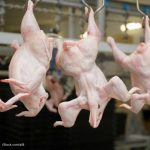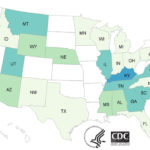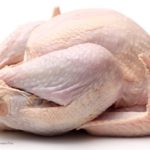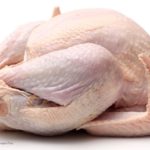A new study has shown that drift from a poultry farm moved aerosols onto a nearby almond orchard and altered the leaf microbiome. The study was published in Applied and Environmental Microbiology. Raw almonds have been linked to Salmonella outbreaks in the past. There were also outbreaks linked to raw almonds in 2000 and 2005 in California, and in 2012 in Australia. The movement of pathogens from animal operations into adjacent plant crop fields is not well characterized. The study showed that dust and bioaerosols moved from a commercial poultry operation a short distance into an almond orchard. The scientists found that the microbiome on the leaves was altered. The study was conducted over a two year period. Swabs of orchard soil surface and air, soil, and almond leaf samples … [Read more...]
Stop Foodborne Illness, CSPI Call For Poultry Safety Modernization
The food safety agencies Stop Foodborne Illness and the Center for Science in the Public Interest (CSPI) are calling for poultry safety modernization to reduce Salmonella and Campylobacter infections in poultry. Those agencies believe that the USDA's regulatory framework lags behind advances in science and technology and doesn't reflect the best. practices to prevent illness from poultry. Stop Foodborne Illness CEO Mitzi Baum said in a statement, "To their credit, FSIS, academic experts, and many poultry industry leaders recognize the poultry safety problem and are working on solutions. Consumers rightfully expect, however, that FSIS build today’s best practices into its regulatory system so they can become common practices. Outbreaks linked to poultry products have occurred … [Read more...]
Backyard Poultry Salmonella Outbreak Sickens 97 in 28 States
The Centers for Disease Control and Prevention (CDC) has issued a report about a backyard poultry Salmonella outbreak that has sickened at least 97 people in 28 states. This is not the first such outbreak; many of these outbreaks have been identified in the past few years. One of the issues is that Salmonella bacteria can be naturally present in chickens, even inside hen's ovaries, which then produce contaminated eggs. The pathogen is Salmonella Hadar. Seventeen people have been hospitalized because they are so sick. And 30% of ill persons are children younger than five. Epidemiologic evidence shows that contact with backyard poultry such as chicks and ducklings is the likely source of this outbreak. In interviews, 38, or 86% of 44 ill persons interviewed, said they had contact … [Read more...]
Tips For Handling Raw Chicken to Avoid Food Poisoning
The Centers for Disease Control and Prevention (CDC) has released information about handling raw chicken to avoid food poisoning. Raw chicken is often contaminated with pathogens such as Campylobacter, Salmonella, and Clostridium perfringens. About a million Americans get sick with food poisoning after eating improperly prepared chicken every year. To prevent food poisoning from chicken, there are some things you can do. First, when you're shopping, put any raw poultry in a disposable bag before placing it in your shopping cart. Refrigerate the poultry promptly when you get home. Wash your hands with warm soapy water for 20 seconds after handling raw chicken. And never even rinse or wash raw chicken. The water can cause the bacteria on the chicken to aerosolize and spread it … [Read more...]
Salmonella Outbreak in Canada Linked to Raw Turkey and Chicken Ends
The Salmonella outbreak in Canada linked to raw turkey and chicken is over, according to a notice published on Public Health Canada. Even though the outbreak is over, officials say that "illnesses could be reported because this Salmonella strain is present in some raw turkey and raw chicken products in the Canadian marketplace." Officials recommend that consumers handle raw turkey and raw chicken carefully and cook it thoroughly to 165°F as measured by a food thermometer to avoid food related illnesses such as Salmonella. In total, there were 130 confirmed cases of Salmonella Reading in these provinces and territories: British Columbia (33), Alberta (44), Saskatchewan (8), Manitoba (25), Ontario (9), Quebec (2), New Brunswick (1), Prince Edward Island (1), Northwest Territories … [Read more...]
Antibiotic-Free or Organic Poultry Less Likely to Have MultiDrug-Resistant Bacteria
A study conducted at the Pennsylvania Department of Health, along with the Penn State College of Medicine and the FDA, found that meat from conventionally-raised poultry harbored almost twice as much multidrug-resistant Salmonella bacteria as meat from antibiotic-free or organic poultry. The study was presented at IDWeek 2019. Consuming Salmonella-contaminated meat is one of the most common causes of foodborne illness. Since this infection is treated with antibiotics, when the pathogen is resistant to many different commonly used drugs, the illness can be more serious and dangerous. The overuse and misuse of antibiotics in both humans and animals raised for food leads to antibiotic resistance. The FDA has issued guidance documents, which are not legally binding, to try to limit … [Read more...]
USDA Study: Bacteria From Raw Chicken Transferred to Salads
A recent study conducted by the U.S. Department of Agriculture (USDA) has found that consumers put themselves at risk of serious illness by washing or rinsing raw poultry. Bacteria from raw chicken is easily transferred to other surfaces. This common practice used to be recommended in cookbooks. But research has found that rinsing raw poultry aerosolizes the bacteria and the pathogens can spread up to three feet away from the faucet. In addition, the sink will most likely be contaminated. Dr. Mindy Brashears, the USDA's Deputy Under Secretary for Food Safety said in a statement, "During this year’s study, 26 percent of participants that washed raw poultry transferred bacteria from that raw poultry to their ready to eat salad lettuce. Fortunately, small changes in the kitchen can … [Read more...]
Food & Water Watch Finds Privatized Inspection System Produces More Contaminated Chicken
Food & Watch Watch has analyzed the USDA's regulatory sampling for Salmonella bacteria in the country's poultry slaughter plants, and has found that more contaminated chicken is being produced. Thirty percent of plants operating under the new privatized system have failed the performance standard for that pathogenic bacteria. The New Poultry Inspection System (NPIS) removes USDA inspectors from slaughter lines. Company employees are now responsible for inspections, under this system. Just one USDA inspector is on each line, and that person must inspect three birds per second. The final rule, proposed in 2012, was published in 2014. USDA argued that this inspection system would reduce the incidence of Salmonella contamination. Wenonah Hauter, executive director of Food & … [Read more...]
Top Chicken Brands Inspected by Employees
Food & Water Watch released a list of poultry plants, along with their supermarket brands, that are participating in the USDA's New Poultry Inspection System (NPIS) that removes government inspectors from slaughter lines and gives that responsibility to company employees. This comes right after reports that some employees are denied bathroom breaks, so have taken to wearing diapers to work. Wenonah Hauter, Executive Director of Food & Water Watch said in a statement, "As consumers get ready for the summer grilling season, they need to know which poultry plants are using privatized inspection to prioritize efficiency and profits over people. The USDA should never have allowed companies to police themselves, but to add insult to injury, they failed to even let consumers know … [Read more...]
Research Project To Study Improved Salmonella Detection
USPOULTRY and the USPOULTRY Foundation announce the completion of a research project at the University of Arkansas in Fayetteville, which developed a rapid detection assay for Salmonella that may be used in U.S. poultry processing plants. Salmonella contamination on poultry has been a huge problem in U.S. facilities, as evidence by the large Salmonella outbreak linked to Foster Farms chicken processing plants last year. The method detects and quantifies viable Salmonella servers in poultry carcasses without selective enrichment. The researchers found that growth of Salmonella occurred on Luria Bertani broth than on selective enrichment. Using nonselective media that supports the rapid growth of this bacteria greatly cuts assay time. The project "provides potential reliable and rapid … [Read more...]












